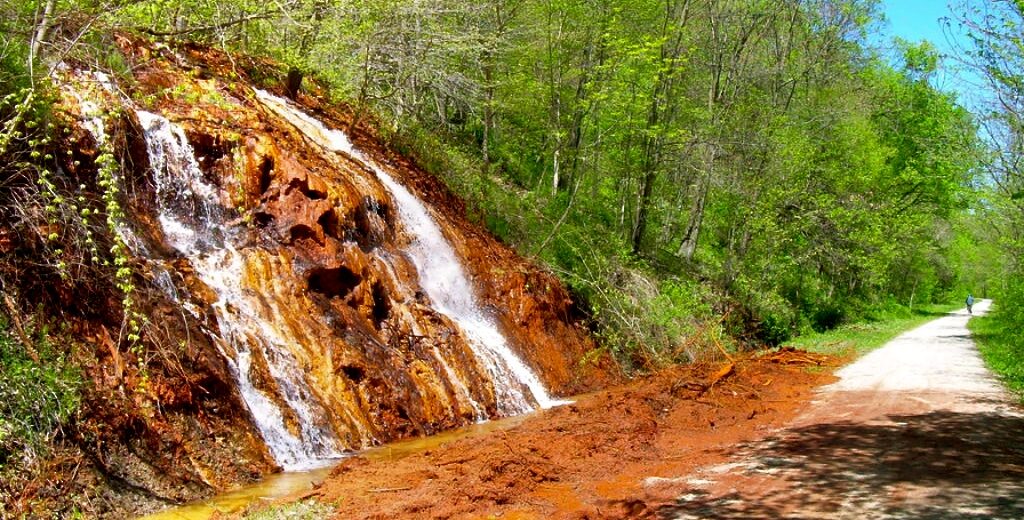
Acid mine drainage is one of the most visible and costly impacts of coal mining, turning Appalachian waterways rust orange with dangerous pollution and threatening the health of people and wildlife. Remediation of this pollution requires long-term treatment facilities and long-term funding.
In 2021, Congress enacted the Bipartisan Infrastructure Law, which included an unprecedented and transformative 11.3 billion dollars for cleaning up abandoned coal mines. But unfortunately, the new law does not allow states to set money aside for long-term acid mine drainage treatment facilities. In response to this, concerned community members collaborated with Congress to create The STREAM Act – a bill that would solve this problem – and it just passed the House! This bill passed the House thanks to the hard work of advocates like you. Can you join us in reaching out to the Senate to help us get this bill over the finish line?
The Bipartisan Infrastructure Law funding will allow states and tribes with abandoned mines to revitalize streams and rivers devastated by coal pollution. Still, we need to make sure states have the freedom to spend this money on long-term treatment of acid mine drainage. Cleaning up these waterways will also allow communities to invest in the outdoor recreation economy, creating new jobs in areas transitioning away from fossil-fuel-based economies.
What our advocates have to say on this:
“Abandoned mines and their discharges into waterways threaten people and wildlife alike,” said David Willms, senior director of Western wildlife and public lands at the National Wildlife Federation. “The STREAM Act is a common-sense, bipartisan proposal to reclaim and restore mining sites, protect clean drinking water, and support the nation’s $887 billion outdoor recreation economy. Thank you to Representatives McKinley and Cartwright and the House for passing this important legislation. The Senate should swiftly follow suit.”
“Without the STREAM Act, organizations like ours would not be able to access sizable new federal investments to build on our work to clean up acid mine drainage in the tributaries of the Cheat River,” said Amanda Pitzer, Executive Director of Friends of the Cheat in West Virginia. “We appreciate Congressman McKinley’s leadership in introducing this solution which will help clean up our water, create jobs, and support our communities. Now, we hope our senators follow through by passing this bipartisan bill promptly to unlock these dollars so they start to have a positive impact across West Virginia.”
“Acid mine drainage threatens the health of people and wildlife for decades after coal mines have been abandoned, and it is imperative states can create and sustain long-term solutions to this long-term problem,” Sierra Club Senior Organizing Representative Bonnie Swinford said. “The STREAM Act is a commonsense and much-needed piece of legislation, and we congratulate Congressman Matt Cartwright and his colleagues on its passage in the House. Now, the Senate must quickly pass the STREAM Act to protect the health of communities across the country, create jobs, and revitalize local economies.”
“We are grateful for Congressman Cartwright’s leadership on this key issue,” said Bobby Hughes, Executive Director of the Eastern Pennsylvania Coalition for Abandoned Mine Reclamation (EPCAMR). “Ensuring that funds exist for long-term opération and maintenance is essential for making sure that acid mine drainage (AMD) problems are addressed and that we have waterways that are inviting for recreation and safe for community use. Now is the time we really need private landowners to be open to consideration of future monitoring and eventual treatment of AMD if we are going to clean up Pennsylvania’s over 5500 miles of impaired waterways.
“No one should have to live in a community threatened by polluted water, so we are grateful for Rep. Cartwright, Rep. McKinley, Senator Casey, and Senator Braun’s efforts to solve the acid mine drainage crisis while creating jobs at the same time,” said Chelsea Barnes, Legislative Director of Appalachian Voices. “This simple fix would not cost taxpayers any additional money and would bring new resources to communities hit hard by the decline of coal. Now that the bill has passed the House, the Senate needs to get on board and support this common-sense solution to a decades-long crisis as soon as possible.”
The current AML program allows states to set aside 30% of AML funding each year into accounts that accrue interest and can cover these perpetual costs. But when the infrastructure bill and its sizable AML investments were passed last year, it did not include a similar provision. The STREAM Act addresses that oversight, ensuring the new infusion of funding can be used for long-term AMD treatment. 34 community organizations endorsed the STREAM Act when it was introduced in March. Advocates will now turn their attention to encouraging the Senate to pass the bill with the same bipartisan backing.


